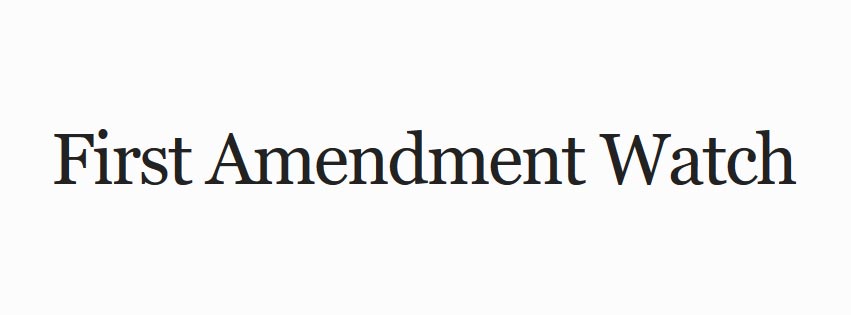October 11, 2017
Carter Journalism Institute Launches “First Amendment Watch” to Highlight, Analyze Threats to Freedom of Expression

NYU’s Arthur L. Carter Journalism Institute has launched First Amendment Watch—an online resource that goes beyond the headlines to provide much-needed coverage and context to the debate over freedom of expression.
First Amendment Watch (FirstAmendmentWatch.org) documents contemporary threats to the freedoms of speech, press, assembly, and petition, posting stories as they arise along with related content to better inform the conversation. Through daily updates, analysis, access to relevant legal cases and historical background, First Amendment Watch includes extensive resources for journalists and a thoughtful public eager to keep up with current controversies and understand how First Amendment principles apply to them.
“Whether it’s white supremacists marching in Charlottesville or demonstrators protesting speakers at Berkeley, Americans are caught up in questions about the freedom of expression,” says Stephen D. Solomon, a professor at the Carter Journalism Institute and the site’s founding editor. “Often the answers come from Supreme Court decisions over conflicts between the freedom of speech and other values of our society.”
“We think that documenting threats to these freedoms and making relevant source material easily accessible—in a measured, non-partisan manner—will provide more clarity to concerns raised in breaking news stories,” adds Tatiana Serafin, a contributing editor to Forbes and First Amendment Watch’s managing editor.
The site tracks critical First Amendment issues such as hate speech, newsgathering practices, fake news, libel, censorship, campus speech, and privacy. Coverage comes from all over the U.S., with accompanying contextual material, an interactive map, and links to additional resources.
In recent weeks, First Amendment Watch has detailed why hate speech is protected by the First Amendment and why efforts to curtail it at Berkeley and other college campuses can lead to a slippery slope of speech restrictions—while also offering a path for opposing parties to begin a dialogue. It has also covered actions of President Trump and other politicians to block Twitter and Facebook followers who criticize them. Coverage includes explanations of the relevant First Amendment principles as well as summaries of pertinent legal cases and links to them, a great resource for journalists and the public.
Solomon, who teaches First Amendment law at the Carter Journalism Institute, authored Revolutionary Dissent: How the Founding Generation Created the Freedom of Speech (St. Martin’s Press, 2016), which explored the birth of freedom of expression in America’s founding period, as well as Ellery’s Protest: How One Young Man Defied Tradition and Sparked the Battle Over School Prayer (University of Michigan Press, 2009), which chronicled the controversial Supreme Court case that ended state-sponsored prayer and Bible reading in the public schools. He is one of the panel of 15 experts who contribute to the quarterly “report card on the state of the First Amendment” produced by the Newseum Institute.
Serafin, an adjunct professor of journalism at Marymount Manhattan College, has covered issues of press freedom for various publications, including “I, Journalist,” for the Seventh Wave. She was previously a staff writer at Forbes and then co-editor of the magazine’s billionaires list, initiating coverage of billionaires in Eastern Europe and Central Asia.